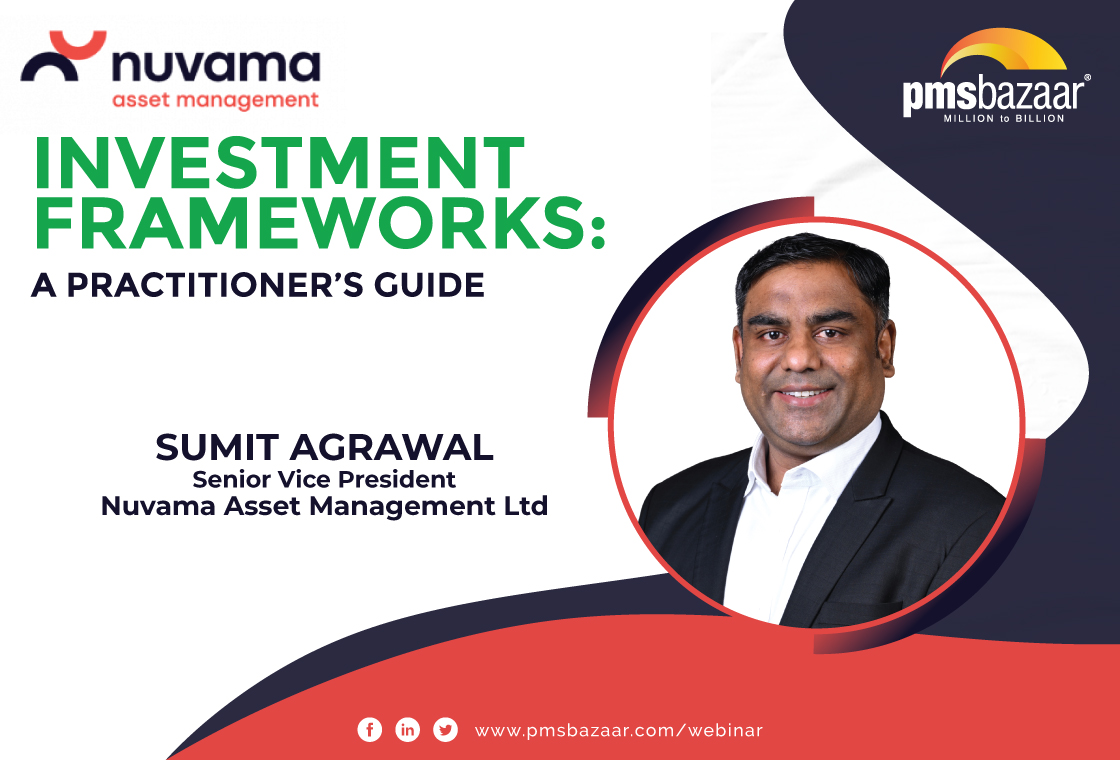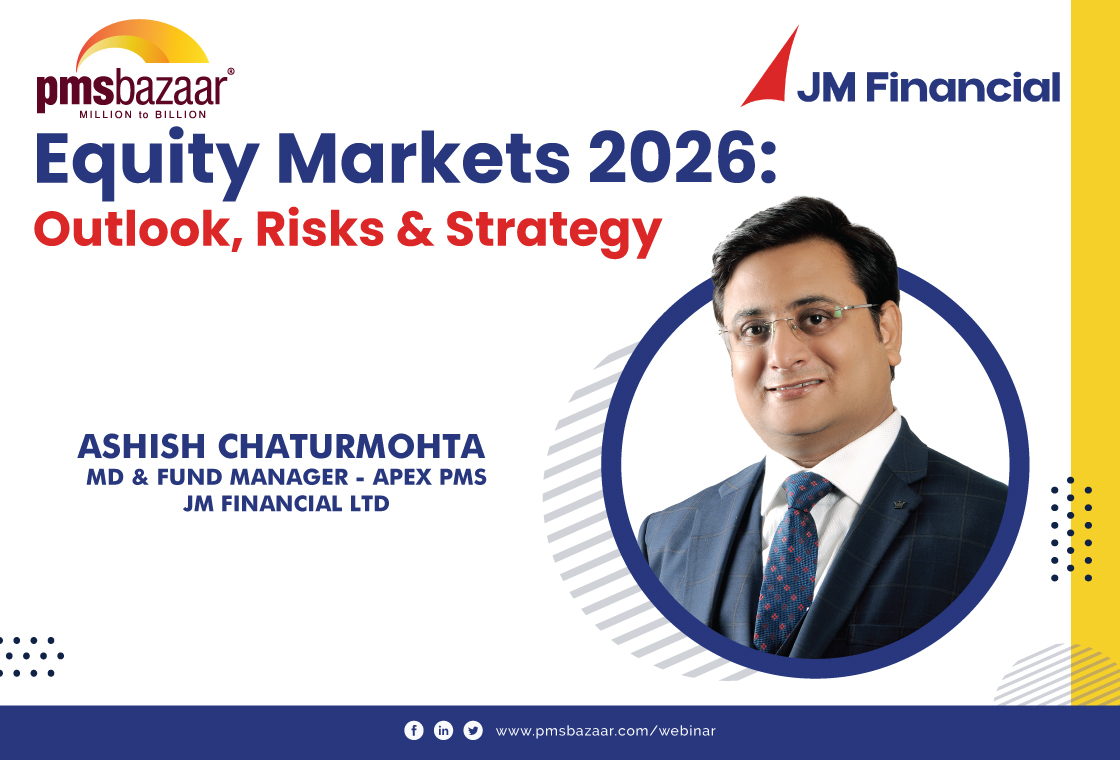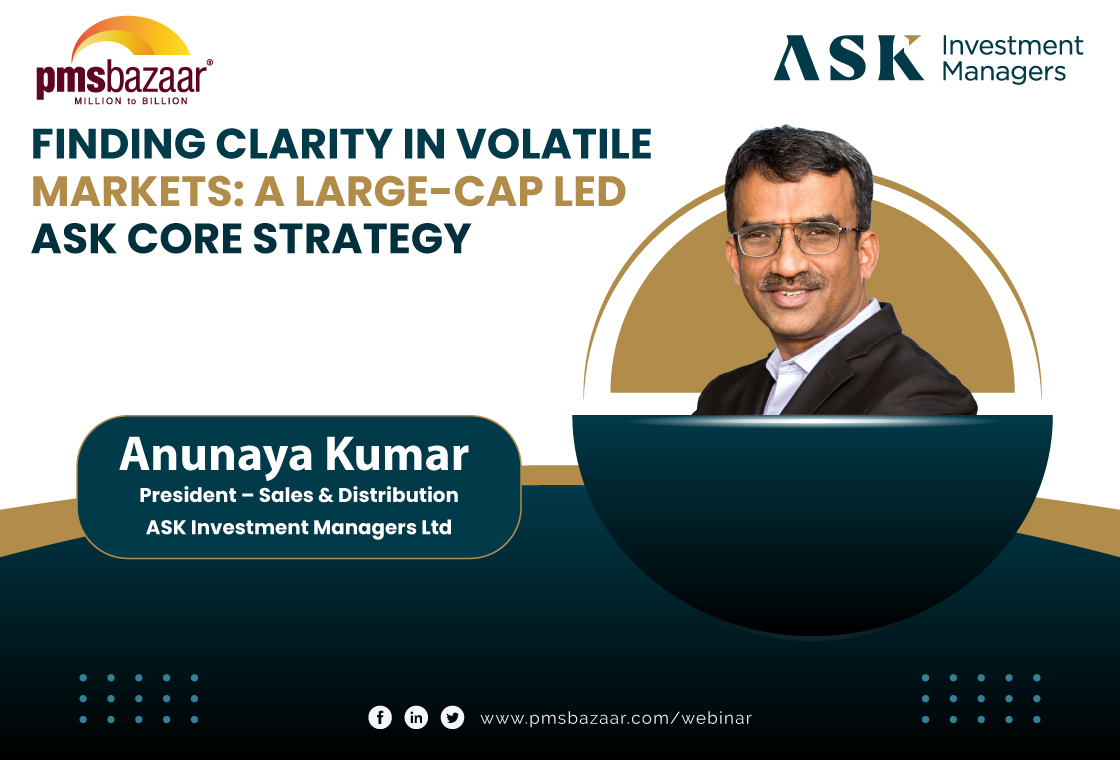This Blog is an excerpt from an Exclusive Webinar organized by PMS Bazaar, hosting successful women fund managers of the Alternative Investment Industry.

The Webinar was a show of feminine strength with three accomplished women from the world of finance and investments sharing their thoughts on women taking money matters into their hands, markets, and a host of other topics. Ms. Devina Mehra, Managing Director at First Global; Ms. Aditi Mittal, Director at IndiaBonds.com, and Ms. Geetika Gupta, Fund Manager-PMS & AIF at ICICI Prudential AMC, were the participants in this enlightening discussion.
Ms. Mehra started off by saying that the markets were gender agnostic. However, she observed that in her several decades of investment banking experience, the number of women in the field of finance still remains low.
Ms. Mittal concurred with Ms. Mehra and went on the add that women bring the additional empathy factor or emotional quotient to the workplace, which was an added advantage.
Then Ms. Gupta went on to state that she never looked at her career accomplishments and progression in top educational institutes or workplaces from the point of view of being a woman. She opined that women's power for her meant being heard at the decision-making high tables.
Balancing work and life
The discussion then veered towards the most important factor determining a woman’s career – work-life balance.
Ms. Mittal said men to play supportive roles and shoulder responsibilities at home, but went on to observe the work-life question is never asked to men. She was emphatic in her opinion that women were very good at multitasking, which said was a blessing in dealing with all home and work-related responsibilities. The work-life balance would be possible if women set expectations right, create the right infrastructure, and have clarity of thought.
Talking about her own experiences, Ms. Mehra said she always thought about why things should be different for men and women. Taking up the point about the work-life question being asked only of women, she said women shouldn’t be expected to be superwomen who can juggle work, kids, house duties, and other things easily. She said women have always been forced to make career compromises, which she said is not advisable and takes a toll on mental health.
Ms. Gupta said women should learn how to delegate and not take all responsibilities upon themselves. They should learn to say no. An understanding of spouse and family is necessary.
Dealing with gender stereotyping
Another key issue faced by women was gender stereotyping. Ms. Gupta was of the opinion that there was considerable stereotyping of women in the field of finance. Barring for a brief while when we had many women CEOs heading banks, it has always been a sort of male dominion. She said the glass ceiling is yet to be broken in the case of women. There is always this perception that women may not be good at managing money. And this starts at home, she said. Even successful career women sometimes do not take part in investment decisions at home or are kept out of the process.
Ms. Mehra said women tend to get interrupted in conversations at the office or even board meetings more often than men. They would talk over you. Women should put their foot down in some cases, she said. On women not taking charge of their own finances, she said perhaps the burden of work and family responsibilities bogs them down, with little time or energy to take ownership of their money. She said that only if women take charge of their investments would they have financial independence, and not by merely earning a salary.
Sharing her part of the experience on stereotyping, Ms. Mittal said that in her younger days, when she went to client meetings, she would invariably ask where her father was! Clients would hesitate while dealing with women. Today, many sectors are bringing women at all levels and increasing their presence. On women taking investment responsibilities, she said if one was good at it, she must go ahead, take charge, and not delegate. She said such skills must be passed on to daughters as well, in times to come.
Advice to women investors
On the aspect of whether women are willing to wait it out on investments to pay off, Ms. Mehra said there wasn’t enough data to show that patience led to better investing outcomes. But she said there was sufficient data to show that women made better returns than men, but that the confidence levels are lower.
Ms. Mehra said that she was never discriminated against at home despite having two brothers. She said apart from education, even in lifestyle aspects her father had insisted on similar pastimes as her brothers, for example playing out in the evening or having friends come over. Also, she was never told not to have an opinion.
On what advice she would give women investors, Ms. Gupta said she was biased entirely towards equities as she believed that was the best asset class. Women should first start by asking where they should be parking their surplus or investing their money in the first place. Asset allocation comes later. She said from her perspective any surplus must be parked in equities with a long-term view. The stock markets look daunting for all, more so for women. So, even without doing anything fancy, simple regular equity investing would help women double their money in 5-6 years.
Volatility in the markets
Have the global and local events in recent months made markets too volatile? What is the direction in which equities are headed?
Ms. Mehra said volatility was there, but she saw very limited downside from hereon in the Indian markets. In the 40-odd years since the benchmark Sensex came into existence, each decade has been very different in terms of compounding of returns. In the 2010-20 decade, the markets barely gave 8.5% CAGR. So, she believed the rally that started in April 2020 would last for a while. Also, Indian markets have been relatively underperformers compared to global indices. Ms. Mehra opined that now the risk of missing out on a rally was higher for investors.
Remaining invested was critical in her view as missing just the 10 best days over many decades would drastically bring down the overall returns. Only when investors are fearful and the sentiment is low does an up-move usually take place. From a one-year perspective, it may be a good time to enter the markets. The year 2022 was extraordinarily bad for all asset classes and was an outlier. The probability of 2023 also being bad is less.
Asset allocation holds the key
Has volatility in equities pushed investors more to fixed income now? This question brought about the key aspect of asset allocation in reaching our goals. Ms. Mittal said that managing investment was all about asset allocation. Each asset class has a purpose. Equity gives abnormal gains, with the risk of the unknown. Debt is for regular cash flow, and investments in bonds should be based on your risk appetite. It is not fair the compare these two asset classes. Their purposes are different.
She, however, added that the asset allocation had tilted a bit towards debt in recent times. Since the interest rates are nearing their highest levels, there is merit in considering fixed income, Ms. Mittal opined.
The discussion then veered towards the approaches to be taken for investing, especially in the current environment.
Ms. Mehra said asset allocation was critical. She said even for those in their first job or early in their career, she wouldn’t advise putting their entire savings in equities as predictability is low even with a 2–3-year perspective. Apart from investing in other asset classes for emergency funds etc., she said global diversification is also important as the rupee depreciation against the dollar adds to the returns.
No sector, geography, and theme run forever, she noted and so some amount of flexibility in asset allocation was also necessary. Having an asset manager helps.
On a different note, are the recent banking failures reminiscent of the financial crisis of 2008?
Ms. Mehra said it did not feel that way. In 2008, it was a credit crisis, and banking contagion or problems come out of those situations. Now, however, that is not the case as there is no credit problem and it was more of an asset-liability mismatch. SVB invested in long-dated securities and the rapid rise in interest rates meant that bond prices fell, resulting in losses for the bank. Regulators have also said that deposits would be backstopped.
The talk moved to equity earnings and the outlook for the rest of 2023. The outlook for Indian equities was fine, in Ms. Gupta’s opinion. Since corporate India was in a deleveraging cycle over the past seven years and thus the volatility and interest rate hike did not hurt it. The balance sheet is lean for Indian companies, in her view. The banking sector should be doing well. Manufacturing is another segment that is set to benefit from the government's focus on capex, infrastructure, and incentives such as the PLI. China plus one and Europe plus one are also expected to benefit a few companies, though that not be across the board.
Valuations are still high, but there are pockets of opportunity in Ms. Gupta’s opinion.
On the question of whether the fall in US yields was pointing to a recession, Ms. Mittal sought to take a different approach to the question. She said the yields in the US markets had not risen so fast in the first place in more than 40 years. Inflation was at a multi-decade high. The banking accident caused the recent fall in yields and that confused the markets. So, investors moved from risky assets to risk-free assets such as the US treasuries, causing yields to fall. Inflation is falling but still high. We may not be close to the pivot interest rate yet.
Speakers shared more interesting insights and inspiring messages in the webinar. Watch the entire session with the youtube link appended below.
Get access to rich data and analytics of PMS & AIF by subscribing to us. Join the 48000+ investors & experts now: Subscribe NOW
Recent Blogs

January Rout, Extreme Dispersion: PMS Returns Swing From Losses to Gains
Benchmark falls deepened losses, but multi-asset and debt cushioned portfolios meaningfully

Investment Frameworks : A Practitioner’s Guide
PMS Bazaar recently organized a webinar titled “Investment Frameworks: A Practitioner’s Guide,” which featured Mr. Sumit Agrawal, Senior Vice President, Nuvama Asset Management Limited. This blog covers the important points shared in this insightful webinar.

Aurum Multiplier Portfolio - Where Small and Mid-Cap Alpha Meets Large-Cap Stability
PMS Bazaar recently organized a webinar titled “Aurum Multiplier Portfolio - Where Small and Mid-Cap Alpha Meets Large-Cap Stability,” which featured Mr. Sandeep Daga, MD& CIO, Nine Rivers Capital and Mr. Kunal Sabnis, Portfolio Manager, Nine Rivers Capital. This blog covers the important points shared in this insightful webinar.

Flat Markets, Wide Outcomes: How 484 PMS Strategies Performed in Dec 2025
December 2025 was a month where market returns stayed close to flat, with the Nifty 50 TRI at -0.28% and the BSE 500 TRI at -0.24%.

Equity Markets 2026: Outlook, Risks and Strategy
PMS Bazaar recently organized a webinar titled “Equity Markets 2026: Outlook, Risks and Strategy,” which featured Mr. Ashish Chaturmohta, MD & Fund Manager – APEX PMS, JM Financial Limited. This blog covers the important points shared in this insightful webinar.

MICRO CAPS: The Dark Horses of the Indian Equity Market
PMS Bazaar recently organized a webinar titled “MICRO CAPS: The Dark Horses of the Indian Equity Market,” which featured Mr. Rishi Agarwal and Mr. Adheesh Kabra, both Co-Founders and Fund Managers, Aarth AIF. This blog covers the important points shared in this insightful webinar.

Finding Clarity in Volatile Markets: A Large-Cap Led ASK CORE Strategy
PMS Bazaar recently organized a webinar titled “Finding Clarity in Volatile Markets: A Large-Cap Led ASK CORE Strategy,” which featured Mr.Anunaya Kumar, President – Sales and Distribution ASK Investment Managers Limited. This blog covers the important points shared in this insightful webinar.
.jpg)
Passively Active Investing — A Modern Investor’s Lens on ETF-Based PMS
PMS Bazaar recently organized a webinar titled “Passively Active Investing — A Modern Investor’s Lens on ETF-Based PMS,” which featured Mr. Karan Bhatia, Co-Founder and Co-Fund Manager , Pricebridge Honeycomb ETF PMs. This blog covers the important points shared in this insightful webinar.

